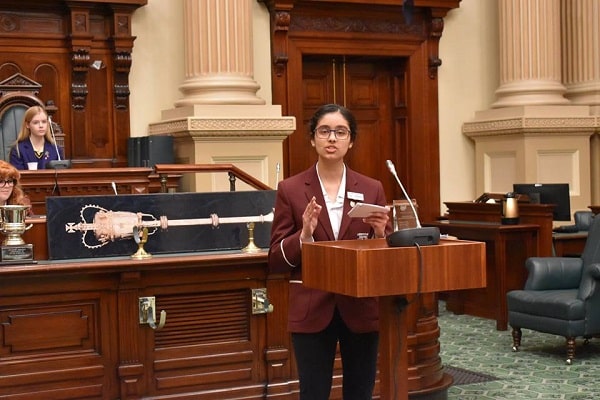
You know you are in debate when school is the extracurricular activity.
My name is Khevalin Parekh and I can completely relate to this statement, because – you guessed it! – I love debating. I am currently a Year 10 student at Aberfoyle Park High School, and I have been taking part in competitive debates for the last four years.
And just recently, the six-member school team that I was a part of won the Year 10 Grand Final Debating Championship for 2017. The championship was held by Debating SA at the House Of Assembly Chamber in the South Australian Parliament. This was a wonderful event that showcased and celebrated the talents of top South Australian debating teams. We beat out 245 other teams this year from 55 other schools from the Catholic, public and private sectors to come out tops in the Year 10 division.
I want to tell you why I love debating and how it has helped me build some really good life skills.
So, what’s debating really like? A debating team in action essentially consists of four members. There is the first speaker, second speaker, third speaker and depending on which side your team is assigned (affirmative or negative) you either provide the timekeeper for the debate (negative) or the chairman (affirmative). The first speaker primarily introduces the team’s case and the overarching points that the team will be focusing on. The second speaker then elaborates on the first speaker’s arguments whilst bringing in new points. The third speaker summarises their respective team’s individual cases and arguments but not before rebutting every single one of the opposition’s points. Every single member of the team is equally as important and without each team member, a team would not be complete.

My team at the championship consisted of six members, and despite the abundance in numbers, I volunteered to be the third speaker in every round of debating that we did. The third speaker’s role is quite a difficult one and consists of rebutting all of the opposition team’s arguments and overall case on the spot. The other five members on my team rotated between the first, second, chairman and timekeeper positions. Being third speaker is my favourite role as I have always wanted to improve my debating skills.
It’s a bit funny why I started debating four years ago. At first, I thought picking debating at school would allow me to develop better skills to argue with my parents at home! However, the adrenalin rush I got from my first few debates pushed me to continue debating from Year 6 till now.
I consider debating to be a mentally stimulating activity, which allows one to thrive under friendly competition. Debating requires a lot of team work, persistence, determination and communication skills.
In fact, I would not have developed crucial life skills if it weren’t for debating. It has allowed me to become a more confident person, in public speaking and in daily life. I have found that I have become less nervous and anxious when talking to someone new and have found ways to break the barrier and avoid awkward situations. It also allows me to think in a rational and logical manner about every situation and examine all its aspects.
Now, let me tell you about the championship itself. Throughout the season, we were provided with very challenging topics such as ‘The development of artificial intelligence is an unacceptable risk to humanity’ or whether ‘Bob Dylan should have been awarded the Nobel Prize for literature.’ But our last topic brought our debating skills to the ultimate test.
Our grand final topic asked whether ‘The clergy should report child sexual abuse revealed during a confession.’ Should the clergy report child sexual abuse revealed during a confession? What a moral and ethical dilemma one can face when deciding how to answer this question!

Our team was assigned the negative side to the topic. This meant we had to argue that child sexual abuse should NOT be revealed during confession. As this is quite a controversial and morally questioning topic, my team was split into two. One half of my team decided that a forfeit would best suit this case for the grand finals rather than to argue on such a basis, as it is obvious that child sexual abuse should always be immediately reported. Nonetheless, after some thorough research into the topic, it was decided that this topic was not about arguing whether child sexual was acceptable or not – our team case was not condoning child sexual abuse – but in fact took a stance to uphold the privacy and sanctity of the confessional. In the end, our rational perspective on this very difficult subject managed to convince three members out of the 5 on the panel of adjudicators that we had the stronger argument and despite all odds against us we were able to emerge victorious.
For argument’s sake
Champion debater and Year 10 student KHEVALIN PAREKH on how competitive debating has enriched her personality and taught her many life skills

Reading Time: 4 minutes



